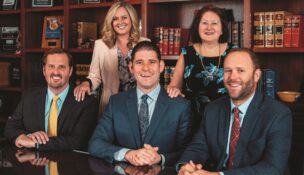Getting your cape caught in the elevator door


Getting your cape caught in the elevator door
For many, an MBA can serve up the right mixture of inspiration, knowledge and networking at a time when it is needed most – but going back to school often means making some sacrifices. Time. Money. A social life. But morals shouldn’t be one of them.
“When the elevator to the boardroom closes, our responsibility as a citizen of the world often gets dropped in lieu of a path to our profession,” says Tim Keane, Dean of the College of Business & Economics. “Take a look at VW, BP, Bernie Madoff, even Martin Shkreli, the pharma executive who raised the price of his firm’s AIDS drug by 5000 percent. The world is full of decision-makers who are putting profits before people. What is it about our profession that says success means sacrificing our morals, our communities, and even our planet for some short-term earnings? What sort of environment are we creating for the next generation of business leaders?”
Rarely does anyone get the chance to guide their corporate career towards ethical and sustainable solutions for humankind. Our superhero capes get caught in the elevator door. We’re left with the decision: Help my planet or help my career and company profit.
But the choice doesn’t have to be mutually exclusive.
Consumers are always getting smarter. Today, the value of any business no longer lies in brand name alone, but in consumer perspectives as well. With more tools at the customer’s disposal to research and share stories, the marketplace is shifting in favor of ethics and fairness.
“Businesses need to be more receptive to social responsibility at the center of every brand,” says Keane. “We’re starting to see this with the green economy and high valuation of a good social media strategy at the center of any marketing plan. It’s not just what you’re selling. There’s market value in the story behind your business – and that story needs to be honest and accountable. If it’s not, consumers will find one that is.”
Today, we know it’s possible to put people before profits and achieve a large amount of success. Tom’s Shoes. Whole Foods. Newman’s Own. Burt’s Bees. All of them successful franchises whose bottom line is about making the world a better place. However, most corporate cultures are still stuck in the 80s mindset of valuing greed over the greater good.
At Regis University, our Jesuit roots give our business programs a unique approach. As we question the modus operandi of our lives and our world, our programs are constantly challenging students to look for a better way. In all of our business programs, we’re putting ethics and social responsibility at the center of every student experience – and it’s really paying off for our graduates.
Value is no longer built solely on sales. Not all returns are found on the bottom line. As our students tackle real-world problems from a Jesuit perspective, they learn to approach ideas creatively, effectively and ethically. Rest assured, the shift towards a values-centered marketplace will only continue to grow – just ask a certain German automaker whose profits continue to plunge today.
Go here to inquire about our MBA program.
(This sponsored content was provided by Regis University College of Business & Economics.)













